You are viewing the Cultures of Knowledge Blog archive for the ‘Projects and Centres’ Category:
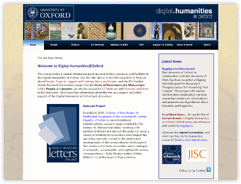 We were this week’s featured project on Digital.Humanities@Oxford, meaning a coveted front-page slot for a brief description of Cultures of Knowledge and the logo for our union catalogue, Early Modern Letters Online. Recently given a facelift and some important new functionality, DH@O is a central hub for information about relevant activities, resources, and activities in Oxford – one of the most established centres of digital humanities in the world – and features a growing relational database of people and projects involved.
We were this week’s featured project on Digital.Humanities@Oxford, meaning a coveted front-page slot for a brief description of Cultures of Knowledge and the logo for our union catalogue, Early Modern Letters Online. Recently given a facelift and some important new functionality, DH@O is a central hub for information about relevant activities, resources, and activities in Oxford – one of the most established centres of digital humanities in the world – and features a growing relational database of people and projects involved.
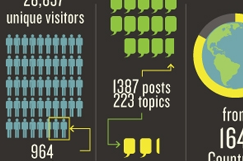
Detail from the graphic.
Melissa Terras from the UCL Centre for Digital Humanities has, with the support of the UCLCDH, created a wonderful infographic of this exciting field. While not completely comprehensive, the visualization combines data from a wide variety of online sources across a range of measurable criteria, and is definitely worth a look. The infographic is available via the UCLCDH Flickr Stream or as a print download (pdf).
Elsevier, a world-leading provider of scientific, technical, and medical information products and services, and the Scaliger Institute of Leiden University Libraries have announced the founding of a three-year fellowship program to enable international rare books scholars to study century scientific scholarship and publishing in the early modern period. The program will support two scholars to work with the extensive Leiden University Special Collections and the Elsevier Heritage Collection – recently catalogued online – for a period of one to three months annually. They will also be invited to share their research through public lectures and publications. The closing date for applications is 1 March 2012. For further information and the application form please visit the websites of Elsevier or the Scaliger Institute. Please address queries to scaliger@library(at)leidenuniv.nl.
In exciting news for scholars of the Moravian educator and CofK stalwart Jan Amos Comenius, two Comenius-related publications prepared by colleagues and partners at the Czech Academy of Sciences have recently been released:
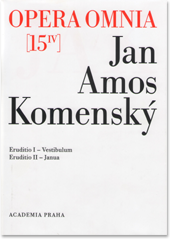 The new volume of J. A. Comenii Opera Omnia, 15/IV, appeared with Academia (Prague) in November 2011. Prepared by Martin Steiner, Markéta Klosová, and others, the volume builds on three installments already published under 15 and continues the ongoing work of the Opera Didactia Omnia corpus. The edition encompasses a significant part of Comenius’s activities in Hungary, including complete versions of textbooks prepared for the first two classes of his Latin school, and includes a full editorial apparatus as well as notes, comments, and summaries of information on edited works already available in English. For further information and to order a copy, please visit the publisher’s website.
The new volume of J. A. Comenii Opera Omnia, 15/IV, appeared with Academia (Prague) in November 2011. Prepared by Martin Steiner, Markéta Klosová, and others, the volume builds on three installments already published under 15 and continues the ongoing work of the Opera Didactia Omnia corpus. The edition encompasses a significant part of Comenius’s activities in Hungary, including complete versions of textbooks prepared for the first two classes of his Latin school, and includes a full editorial apparatus as well as notes, comments, and summaries of information on edited works already available in English. For further information and to order a copy, please visit the publisher’s website.
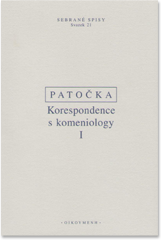 The letters of Jan Patočka, prepared by Věra Schifferová, have also been released in two volumes (1931-77) by Oikoymenh. A leading Czech philosopher of the twentieth century, Patočka was an eminent interpreter of Comenius’s life and work who corresponded extensively with other students of the pedagogue worldwide such as Milada Blekastad, Stanislav Sousedík, Julie Nováková, Jiřina Popelová, Josef Brambora, Antonín Škarka, Dmytro Čyževskyj, Klaus Schaller, Marcelle Denis, Franz Hofmann, and George Henry Turnbull. The letters, published in Czech, shed important light on Comenius as well as on the evolution of scholarly attitudes towards him. For further information and to order a copy, please visit the publisher’s website.
The letters of Jan Patočka, prepared by Věra Schifferová, have also been released in two volumes (1931-77) by Oikoymenh. A leading Czech philosopher of the twentieth century, Patočka was an eminent interpreter of Comenius’s life and work who corresponded extensively with other students of the pedagogue worldwide such as Milada Blekastad, Stanislav Sousedík, Julie Nováková, Jiřina Popelová, Josef Brambora, Antonín Škarka, Dmytro Čyževskyj, Klaus Schaller, Marcelle Denis, Franz Hofmann, and George Henry Turnbull. The letters, published in Czech, shed important light on Comenius as well as on the evolution of scholarly attitudes towards him. For further information and to order a copy, please visit the publisher’s website.
The Scaliger Institute and Brill publishers invite scholars and researchers to submit proposals for the 2012 Brill Fellowship at the Scaliger Institute of Leiden University Library. Brill, the oldest scholarly publishing house in The Netherlands based in Leiden since 1683, is sponsoring the Scaliger Institute from the year 2006 onwards. This contribution provides an opportunity for one or two fellows to come to Leiden University Library each year in order to carry out research in the library’s rich Special Collections. The Brill fellowship is intended for a minimum period of three months and for a maximum period of six months. The allowance, which is intended to cover the costs of accommodation and research, is €1,000 per month. Applications can be submitted by mail and post to the board of the Brill fellowship. The prospective fellow must be involved in one of Brill’s main subject areas: Middle East and Islamic Studies; Asian Studies; Medieval and Early Modern History; Biblical and Religious Studies; Ancient Near East and Egypt and Classical Studies. The Brill fellow is expected to contribute to the activities of the Scaliger Institute and to give a public lecture. When the occasion arises, the lecture will be published by Brill in association with the Scaliger Institute. The closing date for applications is 31 January 2012. For further details and application instructions, please visit the Fellowship webpage.
James Brown
September 12, 2011
Conferences and Workshops, Events, Project Updates, Projects and Centres, Websites and Databases
Tags: CKCC, Eighteenth Century, Geography, Mapping the Republic of Letters, Networks, Seventeenth Century, Spatial Theory, The French Book Trade in Enlightenment Europe
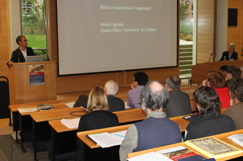
Miles Ogborn’s keynote.
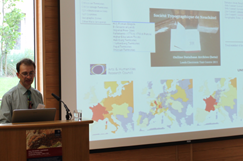
Simon Burrows from the FBTIEE project.
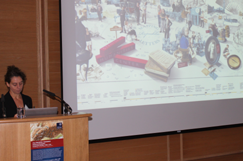
Giovanna Ceserani’s keynote.
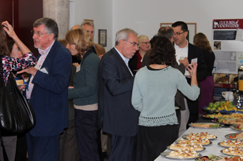
Discussions continue over lunch.
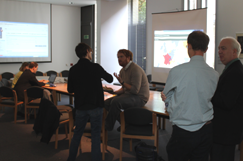
Testing the demonstrators.
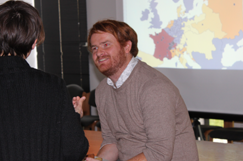
Mark Curran from the FBTIEE project.
The Project’s second international conference, International Geography: Comparative Studies, 1550-1700, took place at St Anne’s College last week on 5–7 September 2011. The event, which was attended by over sixty delegates, allowed twenty-seven emerging and established scholars to present conceptual papers and rich case studies – from Europe and the wider world – which both explored the organization of early modern intellectual activity across time and space, and attempted to implement and refine the concept of ‘intellectual geography’ as a new means of understanding and appreciating the spatial dimensions of intellectual exchange. On the final day, papers from several digital projects – including our good friends from CKCC (Huygens ING) and Mapping the Republic of Letters (Stanford) and new friends from The French Book Trade in Enlightenment Europe (Leeds) – shared some of the opportunities and challenges of capturing and visualizing intellectual geography electronically. Delegates were also treated to a drinks reception in the historic Museum of the History of Science (which incorporated a talk and tour of the intellectual geography of scientific objects), and enjoyed playing with software prototypes of the enormously impressive database of the STN archives prepared by the FBTIEE project, as well as of our own union catalogue of intellectual correspondence. Conference reports, videos, and other outputs will be available soon; in the meantime, for further information, including speaker profiles and abstracts, please visit the conference microsite. Details of our 2012 conference will be available soon.
 We were this week’s featured project on Digital.Humanities@Oxford, meaning a coveted front-page slot for a brief description of Cultures of Knowledge and the logo for our union catalogue, Early Modern Letters Online. Recently given a facelift and some important new functionality, DH@O is a central hub for information about relevant activities, resources, and activities in Oxford – one of the most established centres of digital humanities in the world – and features a growing relational database of people and projects involved.
We were this week’s featured project on Digital.Humanities@Oxford, meaning a coveted front-page slot for a brief description of Cultures of Knowledge and the logo for our union catalogue, Early Modern Letters Online. Recently given a facelift and some important new functionality, DH@O is a central hub for information about relevant activities, resources, and activities in Oxford – one of the most established centres of digital humanities in the world – and features a growing relational database of people and projects involved.










 Join
Join 